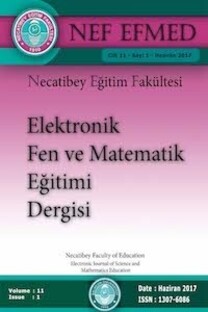Investigation of Reasoning Modes in Making a Decision about Hydroelectric Power Plants which is a Socio- scientific Issue
___
Aikenhead, G. S. (1990) ScientiŞc/technological literacy, criticalreasoning, and classroom practice. In S. P. Norrisand L. M. Phillips (Eds.), Foundations of literacy policy in Canada. Calgary, Alberta, Canada: Detselig Enterprises.Akaya, U., Gültekin, A. B., Dikmen, Ç. B., Durmuş, G. (2009) Baraj ve Hidroelektrik Santrallerin (HES) Çevresel Etkilerinin Analizi: Ilısu Barajı Örneği, 5. Uluslar arası İleri Teknolojiler Sempozyumu (IATS'09), 13-15 Mayıs 2009, Karabük, Türkiye
Coşkun, H. (2010) Nehir Tipi Hidroelektrik Santrallerinin Artvin'deki Orman Ekosistemlerinde Neden Olduğu Arazi Kullanım Değişiminin ve Arazi Tahribatının Belirlenmesi, Yüksek Lisans Tezi, Artvin Çoruh Üniversitesi Fen Bilimleri Enstititüsü Orman Mühendisliği Ana Bilim Dalı
Fleming, R. (1986) Adolescentreasoning in socio-scientiŞcissues. Part I: Social cognition, Journal of Research in ScienceTeaching, 23, 677-687.
Liu, S., Lin, C. ve Tsai, C.-C. (2010) College students' scientiŞc epistemological views and thinking patterns in socioscientiŞc decision making, ScienceEducation, 95(3), 497-517.
Marım, G. & Işıkhan, G. (2011) Hidroelektrik Santraller; Enerji ve Su Hakkı, Anonim, 2010.
Patronis, T., Potari, D., & Spiliotopoulou, V. (1999) Students' argumentation in decision- making on a socio-scientiŞc issue: implications for teaching, International Journal of Science Education, 21, 745-754.
Sadler, T. D. ( 2004) Informal reasoning regarding socioscientific issues: a critical review of research", Journal of Research in ScienceTeaching, 41(5), 513-536.
Sadler, T. D. ( 2004) InformalReasoningRegardingSocioscientificIssues: A Critical Review of Research", Journal of Research in ScienceTeaching, 41(5), 513-536.
Sadler, T. D. ve Fowler, S. R. (2006) A threshold model of content knowledge transfer for socioscientific argumentation, WileyInterScience (www.interscience.wiley.com)
Sadler, T.D. ve Zeidler, D. L. (2005) Patterns of informal reasoning in the context of socioscientiŞc decision making, Journal of Research in Science Teaching, 42(1), 112- 138.
Sarıbaş, M. (2011) Hidroelektrik santralleri (HES'ler) ve doğa yıkımı, Bilim ve Genç Dergisi, 42-49
Şekkeli, M. Ö., Keçecioğlu, F. (2011) Hidroelektrik santrallerin Türkiye'deki gelişimi ve Kahramanmaraş bölgesi örnek çalışması, KSU Mühendislik Bilimleri Dergisi, 14, 2.
Topçu, M. S. (2008) Fen öğretmen adaylarının sosyo-bilimsel konular hakkındaki kritik düşünme yetenekleri ve bu yetenekleri etkileyen faktörler, Doktora Tezi, Orta Doğu Teknik Üniversitesi, Ankara.
Wu, Y. T., & Tsai, C. C. (2007) High school students' informal reasoning on a socioscientific issue: Qualitative and quantitative analyses, International Journal of ScienceEducation, 29(9), 1163 - 1187.
Yang, F. Y., & Anderson, O. R. (2003) Senior highschool students' preference and reasoning modes about nuclear energy use, International Journal of ScienceEducation, 25(2), 221- 244.
Zeidler, D. L., Walker, K. A., Ackett, W. A., & Simmons, M. L. (2002) Tangled up in views: beliefs in the nature of science and responses to socioscientiŞc dilemmas, Science Education, 86, 343-367.
Zeidler, D. L., Sadler, T. D., Simmons, M. L., & Howes, E. V. (2005) Beyond STS: a research-based framework for socioscientiŞc issues education, Science Education, 89(3), 357- 377.
Zohar, A. & Nemet, F. (2002). Fostering students' knowledge and argumentation skills through dilemmas in humangenetics, Journal of Research in ScienceTeaching, 39, 35- 62. Ek.1
- ISSN: 1307-6086
- Yayın Aralığı: 2
- Başlangıç: 2007
- Yayıncı: Balıkesir Üniv. Necatibey Eğitim Fak.
İbrahim DELEN, Sedat ŞEN, Niyazi ERDOĞAN
Biyoloji Öğrenme Anlayışları Ölçeği'nin (BÖAÖ) Geliştirilmesi: Geçerlilik ve Güvenirlik Çalışması
Nazıl Rüya TAŞKIN, Osman YILDIRIM, Sami ÖZGÜR
Primary Students' Problem Solving Skills and Their Variation Depending on the Problem Presentation
GÜL ÜNAL ÇOBAN, Serap ŞENGÖREN KAYA
Gül ÜNAL ÇOBAN, Serap KAYA ŞENGÖREN
9. Sınıf Öğrencilerinin Örüntü Genelleme Problemlerini Çözme Stratejilerinin Belirlenmesi
Melike YAKUT ÇAYİR, Gözde AKYÜZ
Seyhan ERYILMAZ TOKSOY, Serap ÇALIŞKAN
Zeynep KIRYAK, NERMİN BULUNUZ, Özlem ZEYBEK
İBRAHİM DELEN, SEDAT ŞEN, Ni̇yazi̇ ERDOĞAN
Saliha ÖZTÜRK, GÜLŞEN LEBLEBİCİOĞLU
Ortaokul Matematik Öğretmenlerinin Kesirlerin Öğretimine Yönelik Görüşlerinin İncelenmesi
